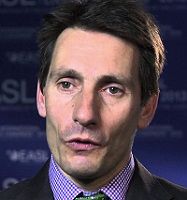Hepatitis C: Drug Prices, Lack of Testing are Challenges
Despite the wealth of choices physicians have in finding drugs to treat hepatitis C infection, two challenges remain in eradicating the disease-price and lack of global screening for the virus.

Despite the wealth of choices physicians have in finding drugs to treat hepatitis C infection, two challenges remain in eradicating the disease—drug price and lack of global screening for the virus.
“Price is solvable,” said Markus Peck, MD, the outgoing secretary of the European Society for the Study of the Liver (EASL) interviewed at the International Liver Congress in Vienna, Austria.
“Pharma has to make some money on these drugs,” Peck said, since their cost of developing them has been high, “but as there is more competition we are quite sure the price will go down.”
There are currently 7 different classifications of drugs that fight hepatitis C. Those are nucleoside and nucleotide NS5B polymerase inhibitors, nucleoside analogs, protease inhibitors, nucleoside analogs, pegylated interferon, NS5A inhibitors, non-nucleoside NS5B inhibitors, and combination drugs that draw on two or more of those classes.
Not counting interferon, there are also 7 drugs or drug combos approved by the US Food and Drug Administration and another 14 in phase 3 drug trials.
Major pharma companies competing for the market include Gilead, AbbVie, Bristol-Myers Squibb, Merck, Janssen, and Genentech.
Much of the meeting centered on reports either on how well the approved drugs are working in the real world, updates on going trials of new products, and abstracts reporting early stage research on potential drug candidates.
Peck agreed that the current hepatitis C drug prices are high, even with some of the hefty discounts manufacturers are offering. Gilead, for instance in February told investors it was offering a 46% discount, which could bring the price of its sofosbuvir/ledipasvir combo (Harvoni) down to $54,000 for a course of treatment from its list price of $94,500.
It’s still a pricey pill, but Peck said, “some rich nations will pay for the poor nations” meaning that taxpayers in Europe and the US will be expected to foot that bill.
The tougher challenge, discussed at a closing day session led by the World Health Organization is finding a way to step up testing.
“Treating patients is not difficult; finding them is,” Peck said, "You can't treat what you haven't found."
High-risk groups include injection drug users, men who have sex with men, and prison inmates—populations that can be hard to reach. Even in Western nations with good health care, routine hepatitis C screening is not the norm.
If those people are found, the global market could be enormous and the virus could be virtually eradicated.
Of course, as with other liver disease, “Prevention is the best strategy,” Peck said, but there too there are obstacles.
“Lifestyle change is the hardest to make,” he said.